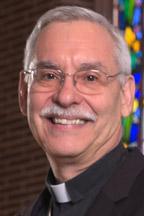
When the sun comes up, it shines on everyone equally. When it rains, the rain falls everywhere in the area, without distinction. When the wind blows, everyone feels the same breeze, and when a storm hits, everyone is exposed to the danger.
Good people don’t get better weather than bad people. Good farmers don’t get more rain than bad farmers.
In our Gospel, Jesus makes a couple of important points. One is that God’s love is like the sun; he loves everyone equally, and that means 100 percent. This is a big change from what we find in the Old Testament, where it says, for instance, in Psalm 145, “God protects all who love him, but the wicked he will utterly destroy.”
Jesus says, “not so!” He says God loves everyone. This means he loves Muslims just as much as he does Catholics. He loves people who experience same-sex attraction just as much as those who experience opposite-sex attraction. He loves politicians of both political parties. He loves Putin and Russian soldiers and doesn’t want anything bad to happen to them. He loves ax murderers, and he loves the police who protect us from them.
He loves bad people as much as he loves good people.
He loves everyone, even the most disgusting people we know, and his love is infinite. Just as the sun shines on everyone equally and the rain falls on everyone equally, so also God loves everyone equally, 100 percent.
Jesus’ second point is that if we are to become like God, then our love must be like his. That’s what Pope Francis is talking about when he speaks of “accompaniment.”
Regardless of what we think about someone else’s behavior or how disgusting they are, our opinion must not get in the way of our love; we must continue to wish them well. He doesn’t say we have to like everyone or approve of their behavior, but we must still love them and want no harm to come to them. Sometimes we must condemn the evil we see around us, cry out against injustice, confront bad deeds, but we are never free to condemn the sinner. After all, we, too, are sinners.
You and I rub shoulders every day with people who we don’t like, and maybe even people who we fear might pose some sort of a threat to us or the well-being of our families. Jesus challenges us to love these aggravating people as God loves them, meaning 100 percent.
And you know, the Church is a microcosm of the world, a gathering of people who may otherwise have nothing special in common beyond our belief in Jesus. We have the full range of personalities in the Church.
I once heard a speaker say, “The Church is the place where the person you least want to spend time with is always there.” That’s not always true, but even so, the Church is a place to learn to live with ambiguity. And, I might add, a place to learn to love. A place to learn how to build bridges of understanding within our families and within our community rather than walls of separation.
The sun shines its warm rays on everyone, and we are called to do the same. God, grant that our warmth extends to all, and in particular, that we learn better how to love those we like the least.
Bishop Anthony B. Taylor delivered this homily Feb. 19.
Please read our Comments Policy before posting.
Article comments powered by Disqus Don’t sign new abortion petition, Bishop Taylor asks
Don’t sign new abortion petition, Bishop Taylor asks
 Bishop says Hot Springs priest taking leave of absence
Bishop says Hot Springs priest taking leave of absence
 All Souls Mass focuses on grief, loss of loved ones
All Souls Mass focuses on grief, loss of loved ones
 Sin can make following God’s will challenging
Sin can make following God’s will challenging
 Red Mass recognizes two Catholic legal leaders in state
Red Mass recognizes two Catholic legal leaders in state
 Winning directory photo honors Our Lady of Guadalupe
Winning directory photo honors Our Lady of Guadalupe
 St. Paul says: How does the Bible define love?
St. Paul says: How does the Bible define love?
 6 steps to getting married in Diocese of Little Rock
6 steps to getting married in Diocese of Little Rock
 Most frequently asked questions on Catholic marriage
Most frequently asked questions on Catholic marriage
 St. Joseph a model of solidarity with immigrants
St. Joseph a model of solidarity with immigrants
 Two gifts after Jesus’ death: Virgin Mary and Eucharist
Two gifts after Jesus’ death: Virgin Mary and Eucharist
 Why we have an altar, and not just a communion table
Why we have an altar, and not just a communion table
 Pope: Wars should be resolved through nonviolence
Pope: Wars should be resolved through nonviolence
 Living relationship with Jesus Christ in the Eucharist
Living relationship with Jesus Christ in the Eucharist